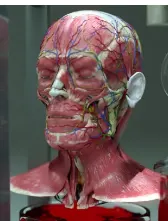In a world’s first, a bioengineering company announced today that it is working on a “head transplant system.”
A startling video suggests transferring a patient’s brain and spinal cord to a donor body via robotics and artificial intelligence (AI).
In as little as eight years, the prototype developed by BrainBridge may be prepared to carry out the ground-breaking medical procedure.
Given that the brain is “capable of lasting several hundred years provided that the rest of the body remains young,” the US startup asserts that patients undergoing the gruesome surgery may even live far longer than the typical lifespan.
However, experts today told MailOnline that the idea is a “bad joke” and “stuff of fiction,” calling it a “gross oversimplification of how the brain works.”
Human head transplantation was deemed unethical in 2016 by the European Association of Neurosurgical Societies’ Ethico-legal Committee.
The committee does, however, have professional recommendations for neurosurgery practice; it is not legally empowered to ban the treatment from being carried out.
At the time, it was considered that there would be significant dangers associated with a patient receiving a head transplant, including the possibility of death.
‘There is no solid evidence base for all steps of the procedure; for some, there is even lack of proof of concept,” it added.
A strange surgeon states that the ground-breaking operation of transplanting the head of a terminally ill man onto a recently deceased donor is near in the future.
To criticise the work of Italian neurosurgeon Sergio Canavero, many medical experts have weighed.
Bioethicist Paul Root Wolpe, from Emory University in the US, is among them, who stated that Canavero’s so-called HEAVEN procedure “Walks a fine line between medical care and murder”, according to Daily Star.
The risky procedure has been planned to be performed on Russian computer scientist Valery Spiridonov, who suffers from a rare muscle-wasting disease.
Two major changes occurred in Spiridonov’s life, as legal challenges in the US delayed the surgery.






